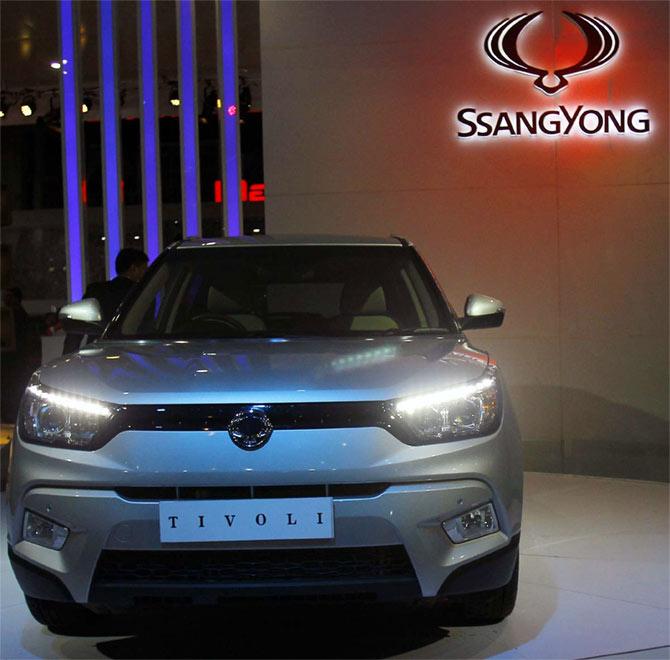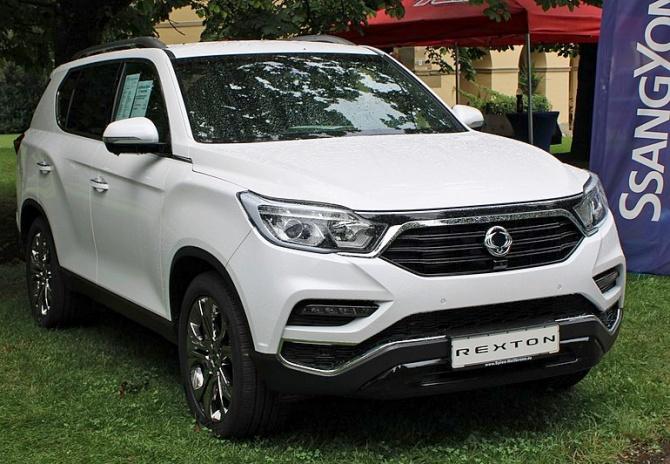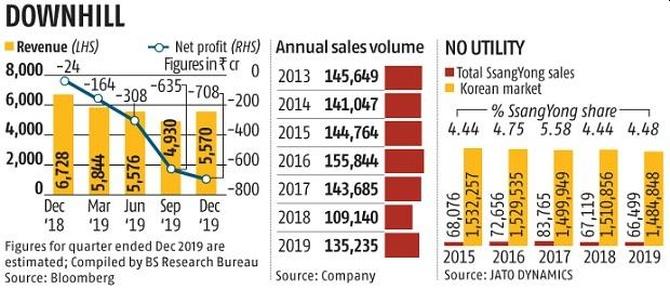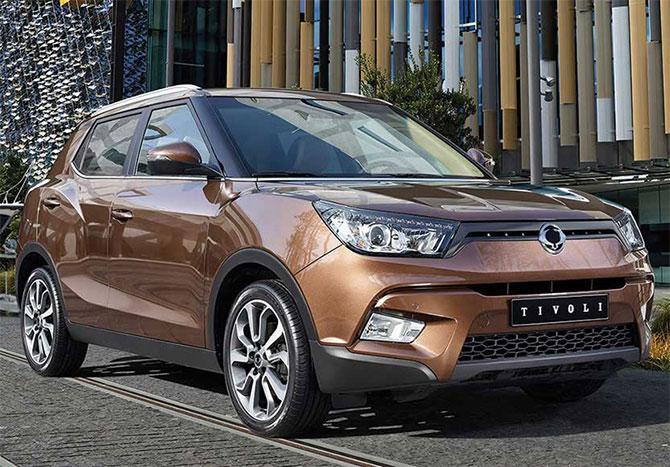A steep contraction in export volumes, sudden changes in buyer preference for gasoline vehicles in Korea, among other factors, caught the company unawares and plunged Mahindra's Korean subsidiary into record losses of Rs 704 crore in calendar year 2019, says Shally Seth Mohile.

The past decade has been a roller-coaster ride for auto companies across the world, including India.
Top decision makers at these firms have confronted disruptions and rapid changes in buying behaviour with regular frequency.
Nobody can vouch for this better than Pawan Goenka, managing director at Mahindra and Mahindra.
When Goenka signed on the dotted line in 2010 to acquire the troubled, bankruptcy-protected SsangYong Motor Company, little did he realise that like the previous two owners -- Daewoo Motor and SAIC -- Mahindra too would have its share of struggles in running the smallest of the Korean automakers.
At the time of the acquisition, Mahindra executives had said the buyout would make SsangYong a competitive global UV player and that the Korean firm will benefit from the Indian conglomerate's financial capability, its competence in sourcing and marketing strategy. In turn, Mahindra would benefit from Ssangyong's technological capabilities.
Nine years after Mahindra completed the acquisition in March 2011, none of these objectives have been met.
Mahindra paid Rs 2,100 crore ($463 million) for the purchase. But each year in the past decade has been tough for the maker of Rexton and Tivoli brands.
The first two months of 2020 have been particularly tough with the outbreak of coronavirus knocking off sales in South Korea to the lowest in 11 years in February.
Clearly, the under-performance has spooked investors. Its share prices have dropped to 1,980 Korean won (as of February 2020) from 9,180 Korean won at the end of the trading season on March 31, 2011.

With a market share of less than 5 per cent, SsangYong is nowhere close to becoming a global SUV player -- neither in scale nor in geographical presence.
Sample this: On an average SsangYong sells 137,000 units (including exports) a year, averaging 11,416 units per month.
Its Korean rival, Kia Motors sold 1.4 million units in 2019, averaging 121,142 units a month. Drill it further and this is what you get: Kia sells a little more than SsangYong's monthly sales in just about four days!
A steep contraction in export volumes, sudden changes in buyer preference for gasoline vehicles in Korea, among other factors, caught the company unawares and plunged Mahindra's Korean subsidiary into record losses of Rs 704 crore in calendar year 2019.
It also forced the maker of Scorpio and XUV5OO to take an impairment charge of Rs 600 crore in the December quarter.
Last month, Goenka had told reporters that the Mahindra-SsangYong board has put in place a three-year plan to pull the company out of the crisis.
"Mahindra will pump in 450-500 billion Korean won ($380 million-$425 million) to revive the company, funded through a mix of debt and equity. The company is also open to strategic divestment," he had said.

"The main reason for their continuous troubles is the product line-up and their absence in key markets," said Felipe Munoz, global analyst at JATO Dynamics.
Although the acquisition by Mahindra has helped the brand enter the Indian market, the Indian parent took too long to ride on the growing SUV market here, he added.
They only brought a competitive product to the Indian market last year with the launch of the Tivoli-derived Mahindra XUV300.
Mahindra, however, has done nothing to explore the two main SUV markets -- China and the USA. Their presence in Europe is very limited, said Munoz.
To be sure, the three-year plan crafted by the Mahindra-SsangYong board includes exploring new markets for the Korean arm. Some of the markets identified include Russia, Vietnam and China.
Goenka, on the other hand, attributed SsangYong's woes to the slowdown and rapid shift in favour of petrol models in the Korean market.
"In automobile manufacturing, when a company is about to break even and the market hits a slowdown, you see cascading impact of several factors at play," he had told reporters last month.
According to him, SsangYong was on its way to break even in CY2019, and "everything was fine until Q1 last year."
Besides the general slowdown in car demand, the company was impacted by its diesel-heavy portfolio as the South Korean market saw a shift to petrol variants under stringent emission norms.
The numbers confirm this. The share of diesel vehicles in Korea's overall automobile sales dropped 44 per cent to 3,85,206 units in calendar year 2019 from 6,92,376 units in 2015, according to JATO Dynamics.
Also, the overall market declined 1.72 per cent year-on-year to 1.4 million units in 2019 from 1.5 million units a year ago.

Andy Bae, analyst at IHS Markit (a global sales forecasting and research firm), South Korea, attributed SsangYong's current state of affairs to the lack of product differentiation, slower pace of new launches and increasing competition from Hyundai, Kia and others in the home market.
According to Bae, in a competitive market, where there are multiple options to choose from, the new Korando does not offer any differentiated proposition in terms of features from the Tivoli.
SsangYong should have been faster to react to the competition, he added. "The Tivoli has been a bestseller for the company for the last three to four years. But it has recently been taking the beating from Kia's Seltos, which has surpassed expectations and successfully appealed to consumers," said Bae.
"Even Rexton is now ageing and its old style doesn't appeal. In contrast, competitors such as Hyundai Palisade and Chevrolet's Traverse, which debuted recently, deliver new style and functions," he added.
As Mahindra hits the accelerator to turn around SsangYong, the company's investors in Korea and India will be keenly awaiting the results in a challenging macroeconomic environment and growing competition in the SUV market in India and elsewhere.











